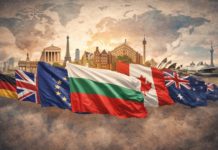Bulgarian elections 2014: Calling all voters - Updated By Rumyana Vakarelska Bulgaria’s early general elections on October 5, 2014 face a few challenges, especially in relation to the potential 2,5 million Bulgarian voters living all over the world of which only 77, 000 voted. Moreover, 38, 766 of those were in Turkey alone with only 5560 in the UK, whereby the biggest number in EU, voted in Spain with 6,149 people. These results from the Central Electoral Commission (CIK), confirmed by the FCO, were correct at the time of print and may fluctuate a little. In EU, following Spain and UK, 3455 voted in Germany and 3148 in Greece, where voters experienced serious difficulties with access to vote, as in UK last year. Further on, 313 voted in Australia, 378, in Russia and 301 in Afghanistan, whereby the results from North America were not yet specified, but may have been included in the overall number of voters abroad.. For many Bulgarians in the UK, the question was not whom to vote for but if to vote, as a few new limitations were imposed on voters abroad following an organisational failure last year that led to many Bulgarian citizens in the UK being unable to cast their vote. This year, Bulgarian voters in UK enjoy the opening of one new polling station in Ealing in West London, access to voting was fair, but the turnout remained low, as Bulgarians in the UK account for a little over 100, 000 although this figure fluctuates up and down, according to the statistics of the Bulgarian and the UK governments alike. This raises many questions and one could reasonably ask if the results so far would have bene the same if the turnout in Bulgaria (below 50 pc) and abroad, which was much lower, would have been the same. Currently, GERB is leading 33pc, followed by BSP with 15,4, 13, 5 for DPS, 9 pc for the Reformist Block (RF) and 7,5 per cent for the Patriotic Front (PF) and 6,1 for Bulgaria without censorship (BBC), where coalitions are yet to be formed. Bulgarians abroad, who collectively represent the biggest foreign investor in the country, bringing to the country a few billion BGN every year with some variations, did not have their own electoral district, which would have helped, as this would have guaranteed that their votes will not be lost when distributed to unknown voting districts in Bulgaria. Secondly, their own district would secure the information of how this significant group of voters think and also inform politicians about their preferences. However, this year Bulgarians abroad will not have the same right as their compatriots in their native country to vote for people, just for parties, therefore their bulletins are different, excluding the print on half of the sheets, where names of party candidates go. The current caretaker government of Georgi Bliznashki, which came to power in July following the early resignation of the socialist coalition government which had been in office since May 2013, had one key goal: organising the next general elections for the MPs in the 43rd National Assembly. It is unclear if the caretaker government had sufficient time to deal with the discrepancies between voters at home and abroad, especially since last year alone, some 19,000 Bulgarians left the country, according to the Bulgarian National Statitstics Institute. This year has been significant for Bulgaria and the Bulgarian political scene in many ways, so further discrepancies in voting rights between Bulgarian abroad and at home will raise eyebrows even more than now. But, as we are not there yet, so let us hope that this will be the last time this happens. In 2014 Bulgarians finally got the right to work without restrictions in the EU, which meant higher and better provisions for the next general elections should have been considered by Bulgarian lawmakers way before the current government came into power, as the nation was looking toward this date after years of limitations imposed by other EU states. In addition, from a UK perspective, the scrutiny that Bulgarian citizens needed to face after January 1 because of the open access to the EU’s labour market, made compatriots fill in the gaps in their overall representation, although significant efforts have been made the current Bulgarian Ambassador to the UK, His Excellence Konstantin Dimitrov, to cope with the media and political attacks against Bulgaria in the UK. In addition, Drugata Bulgaria, the party supposedly representing Bulgarians abroad, is not participating in the elections as, according to the Central Electoral Commission, they failed to register by the registration date. It remains unclear why they did not win their appeal, nonetheless Bulgarians abroad remained formally unrepresented regardless of how many people would have supported Drugata Bulgaria, instead of the leading political parties, GERB, BSP, DPS and the Reformist Block. For a change, something good that Bulgaria has brought to Europe historically and since it joined the EU in 2007, was noticed by the flagship Economist magazine, which on January 1 2014, published a welcome letter to Bulgarians and Romanians, apologising on behalf of the British nation that others have not done the same. Meanwhile, a UK government reshuffle in July that moved the current Coalition government to the right, will leave Bulgarians and Romanians, as well as all EU citizens living in the UK, on guard. Voting is a chance for Bulgarians abroad to influence (although not substantially) their destiny in their adopted country, as it is not constructive to be deterred by the past defaults of the Bulgarian administration in the hope that a new government can better represent their interests. Ongoing developments that may boost voter confidence include the election of the Bulgarian designate for a European Commissioner, Kristalina Georgieva, as one of five new EC Vice Presidents and as Commissioner for the EU’s Budget and Human Resources, as four other candidates, starting with the UK’s Jonathan Hill, applying for Financial Services and Stability Commissioner, face a second hearing or will have to answer in writing questions that remained open during confirmation hearings in the European Parliament. Georgieva came into Bulgarian politics as a US-based Bulgarian ex-patriot and a former Vice-President of the World Bank. Other candidates that did not get approval include Vera Jurua from the Czech Republic, Tibor Navracsics from Hungary, and Miguel Arias Canete from Spain and Pierre Moscovici from France, who all need to send the required answers by the end of our election day on October 5, as the new commission should be announced by end of next week. Another famous expat in France, Julia Kristina, a writer, philosopher and an academic, has last week visited Bulgaria and spoke about the art of rebellion. It seems Bulgarians know well about it anyway, as the only reason we have reached the stage to vote tomorrow are the public demonstrations against Oresharsky’s government for almost an year, a development that has been widely supported by many expats, returning home to see friends and family. Exacta Research polling agency has found that some 55 pc of Bulgarians were planning to vote for the 43rd National Assembly, but the turnout was about ten per cent lower, while it remains questionable if this figure included the intentions of the Bulgarians abroad. One last factor for them to be hesitant about is that parties that could have formed coalitions did not declare in advance any of the obvious possibilities, such as a coalition between GERB and the Reformist Block. Other coalitions are also possible, as BSP has for the first time split up. BSP and its new left-of-the centre rival, ABV, can also feature as a potential partner with DPS being known to sometimes change camps, while the moves of the remaining new entrants (outside ABV and RF) in the face of PF and BBC are yet not known. Copyright ©Rumyana Vakarelska 'Budilnik’ s newspaper new English Language Page contains timely and timeless original journalistic content in print and online on key developments in Bulgaria and Britain and on UK's ex-pat life, aiming to build a higher and well-informed mutual awareness of the two countries and the viable prospects ahead of both. Interested sponsors for the English language page, please contact Rumyana Vakarelska, Team New Europe, an editorial and public affairs consultancy in London by email: rumy.vakarelska@gmail.com
Bulgarian elections 2014: Calling all voters – Updated
Подкрепете инициативата за построяване на български Православен храм в Лондон!















